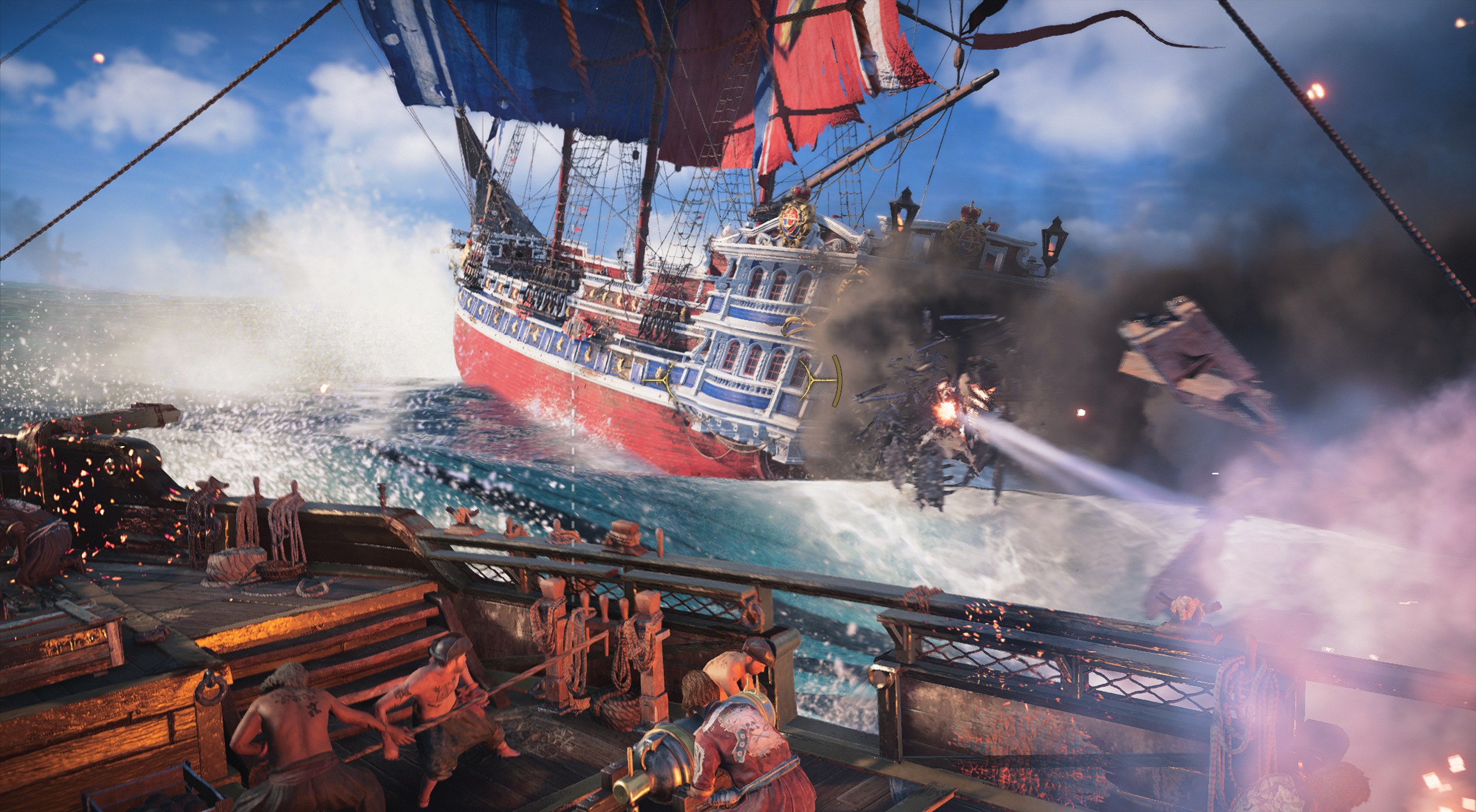Our Verdict
Combining moody and gratifying ship-on-ship combat with shallow live service trappings, Skull and Bones is great within the claustrophobic parameters of what market forces allow it to be.
PC Gamer's got your back
What is it? A live service take on ship-on-ship combat, with origins in an old cherished Assassin's Creed game.
Expect to pay: $60
Release date: Out now
Developer: Ubisoft Singapore
Publisher: Ubisoft
Reviewed on: RTX 3060, Ryzen 5 5600H, 16GB RAM
Steam Deck: Not playable
Link: Official site
The appeal of Skull and Bones is laser focused. It's about being on a boat. You have to want the fantasy of sailing big pirate boats and you need to not want much else for your time and money. You may come wanting to live the fantasy of being a ruthless waterborne pilferer, but to live that fantasy you first need to love sailing a boat in the direction of crafting materials.
In Skull and Bones you're allowed to get off your boat, but only to interact with vendors, mission-givers, mayhaps a buried treasure chest. In the vast island-dotted expanse of the Indian Ocean there are two major pirate settlements where blacksmiths, carpenters, refiners, and most "contracts" (missions) are doled out, both for the main quest and its endgame component.
There's also a great rash of outposts that are functionally identical, playing host to a handful of vendors, the odd treasure chest and some perfunctory loot. You can't whip your sword out and get all cutthroat. No, your violent desire to misappropriate various hot 17th century commodities is all done from behind the wheel. In many ways, you don't sail a boat: you are the boat.
After over a decade in development and with all the writing on the wall, I knew Skull and Bones would be Assassin's Creed: Black Flag by way of the waning full-price live service zeitgeist. I loved that older game. The boating around and the fighting with other boats lent a scale to the then-familiar Assassin's Creed format that seemed to blow salt up your nostrils and sand in your nether regions. It was richly atmospheric: you could smell it. Skull and Bones does recapture that atmosphere, but marrying it with the banal rigmarole of modern live service graft results in something lesser than that ten-year-old game.
Rock the boat
The combat, when it's hairy, can be really tense and fun.
After the usual tutorial preamble I reach the island pirate haven of Saint Anne. During the opening hours I must prove myself to Scurlock, a grizzled pirate haven king with some hectic daddy issues. That involves sailing somewhere, blowing up some number of boats, plundering coastal settlements via the defence of a small pocket of water, and then reporting back to the boss, whose slow unfurling of oceanbound corporate and criminal conspiracy has the whiff of a compelling narrative about it. The Indian Ocean is ridden with competing French and Dutch colonists, but it's also ridden with other pirates and privateers (also other players in the 20-player server, but they can't attack you on sight). As a pirate it's your duty to stick it to them all.
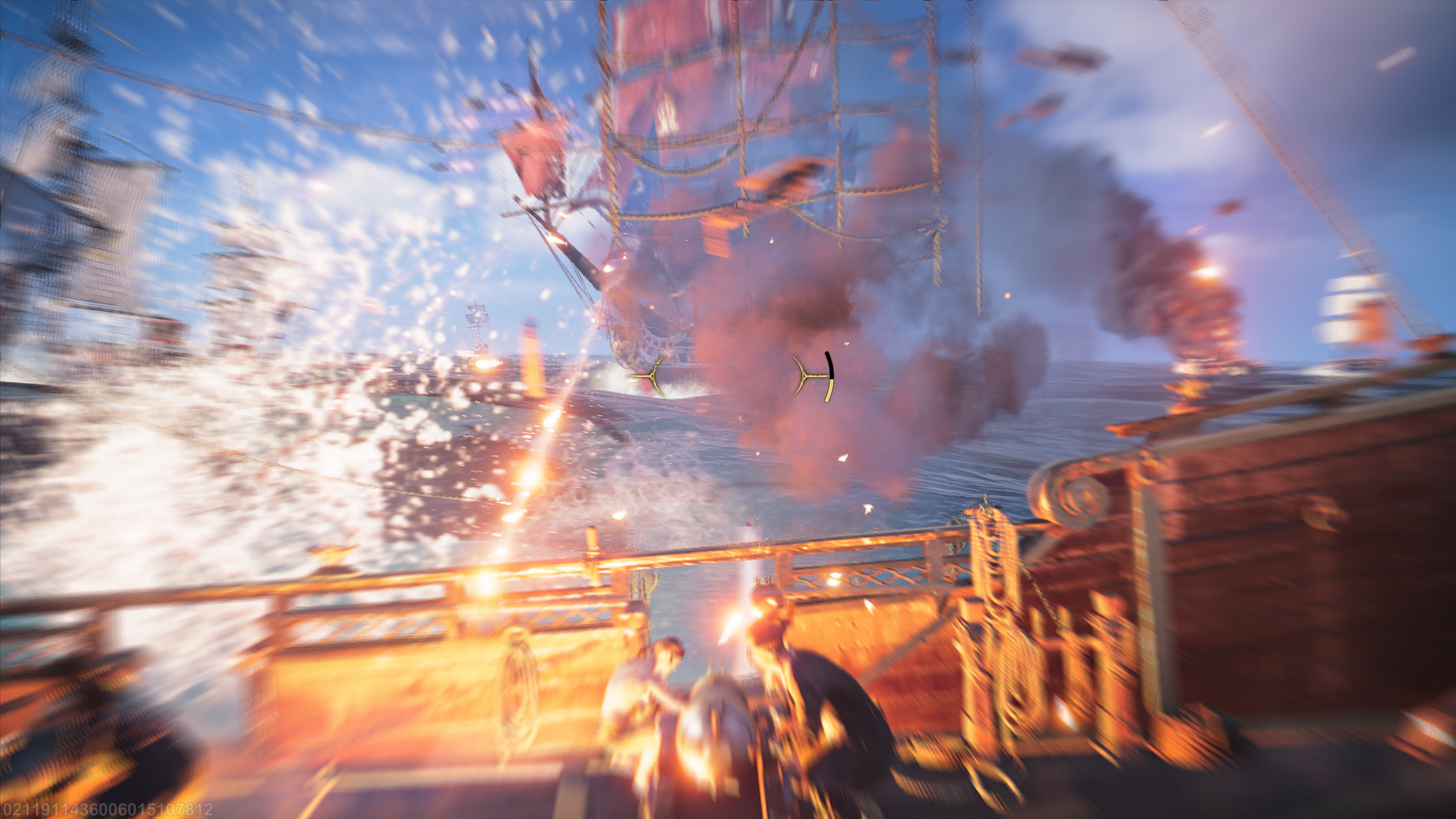
Since I'm a boat I have four sides and space for a central launcher, though whether all slots can host weaponry depends on its class. Gradually, new weapons become available if I buy the blueprints for them. In combat, the weapons—whether canons, ballistas, rockets and more—trigger contextually, so that if I'm facing frontwards to an enemy boat, shooting will trigger that weapon, rather than the ones at my sides. Most of the challenge lies in proactively manoeuvring my boat so that the cooldowns of each weapon have run their course when it matters. For more gruelling battles, planning for where all boats will be in thirty seconds time is essential. This is often challenging because you're a massive boat, at the mercy of a massive boat's turning radius but also factors like wind, waves and the stamina of your crew.
One does not simply buy anything in Skull and Bones that matters: one embarks on a normally-mundane odyssey to make it.
The combat, when it's hairy, can be really tense and fun. In the early hours it can feel cumbersome, even horrible, until the logic of being a boat clicks. Ubisoft Singapore invented Black Flag's (and Assassin Creed 3's) boatfaring violence and they've hit upon a great thing. Duking it out in the always tumultuous Open Seas region at night during fierce electrical storms is thrilling, especially when a rogue wave threatens to take out not only me but also the French bastards on my tail. The manoeuvring and the combat is gratifying, so long as one has the patience to control that boat through an endless parade of MMO-style quests.
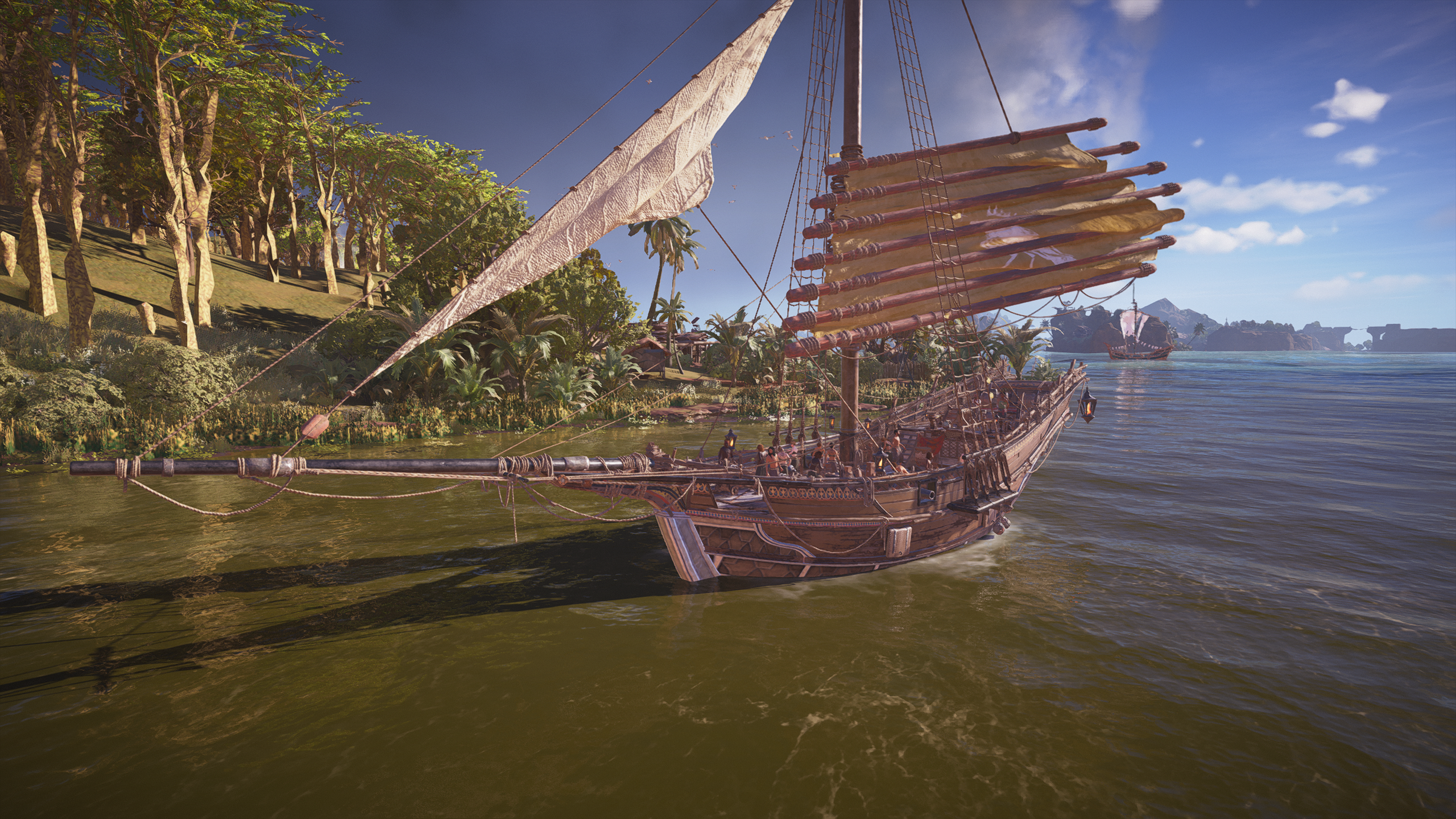
Skullgrinder
In the spirit of modern live service game design, Skull and Bones never lets me perform a simple action when that action can be exploded into three separate actions across vast expanses of water. One does not simply buy anything in Skull and Bones that matters: one embarks on a normally-mundane odyssey to make it.
Let me paint a picture of the mid-game: I want to buy another Basilisk II cannon, because I've been rewarded one gratis for reaching the Marauder infamy rank. It's marginally more powerful than my current cannons, and adds a marginal amount to my boat's overall power rank which, like Destiny, is determined by the level of the gear I have equipped on top of its base rank. I need to raise my boat's rank to tackle a main quest I'm struggling with.
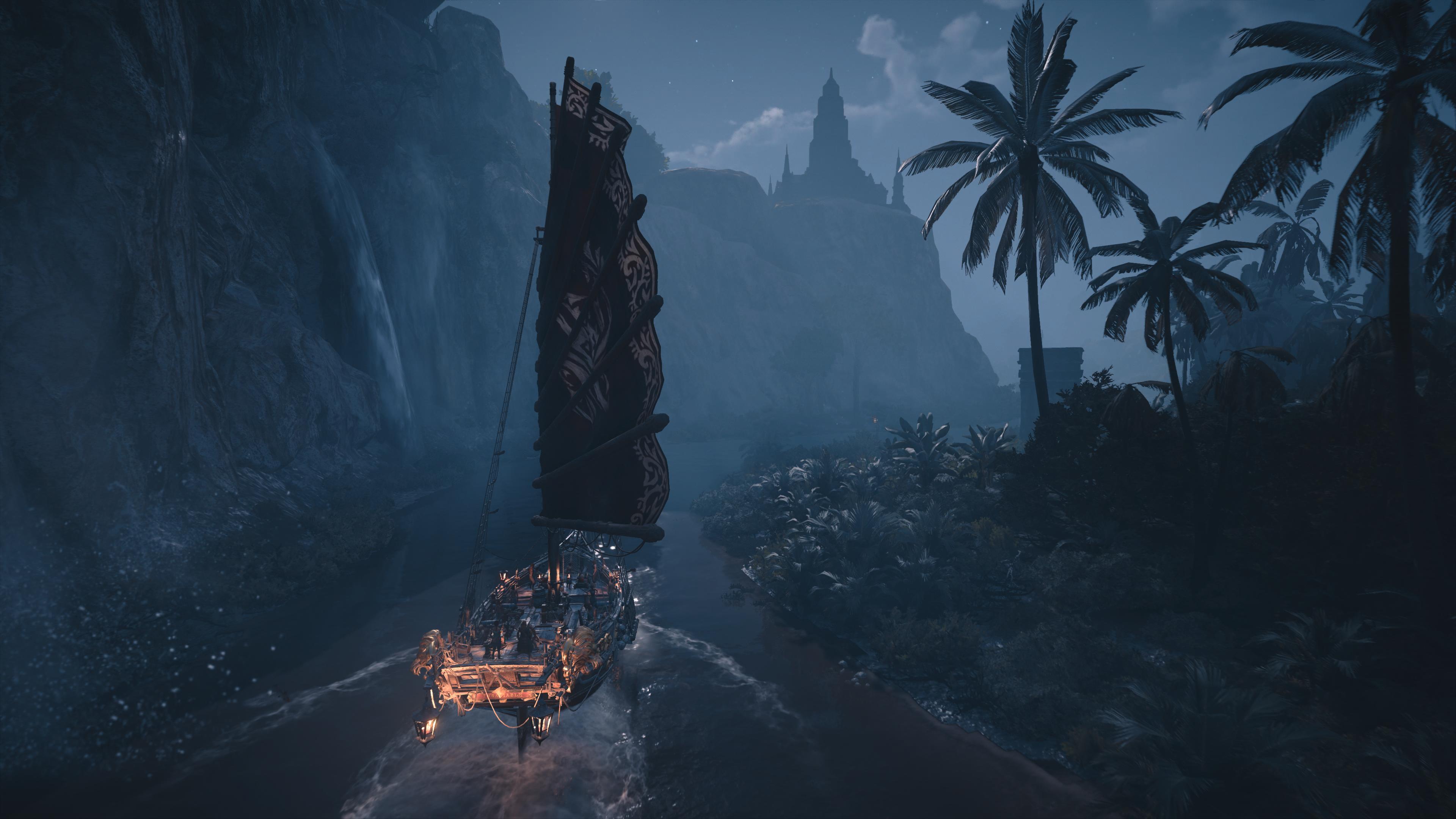
So I set sail for the settlement where the Basilisk II cannon blueprint is held, because everything built in this game first requires a blueprint. I arrive some ten minutes later via conventional sailing rather than fast-travelling, because the latter costs silver depending on the distance, and I'm skint (who am I paying to fast travel me? Does God offer this service? Or Ubisoft?). I arrive to retrieve my longed-for Basilisk II blueprint only to find I need to be the next rank of Infamy, Corsair, to even buy it. I can already equip it! But I cannot buy the blueprint to make another. This came with no forewarning and so pisses me off. I was already dreading the resource grind needed to build the Basilisk II once I had the blueprint, but now I need to grind the rest of my infamy rank out to get it.
I'm in two minds about this: I dislike these delaying tactics that seem borrowed from certain crappy phone and free-to-play games. They're a stand-in for complexity, replacing depth with checkbox-style busywork. This isn't challenging, it's just a drain on that most precious and ephemeral of commodities: real life human time. From early to late game, Skull and Bones is pretty shallow and "winning" is mostly about time investment. I didn't really need to think too hard about what kind of weapons I had equipped—whether torpedos, cannons, balistas, or mortars—so long as I was able to output and absorb damage commensurate with my opponents. On the other hand, getting torpedoes, cannons, balistas, or mortars to equip in the first place, not to mention armor, is a practice in menial labour.
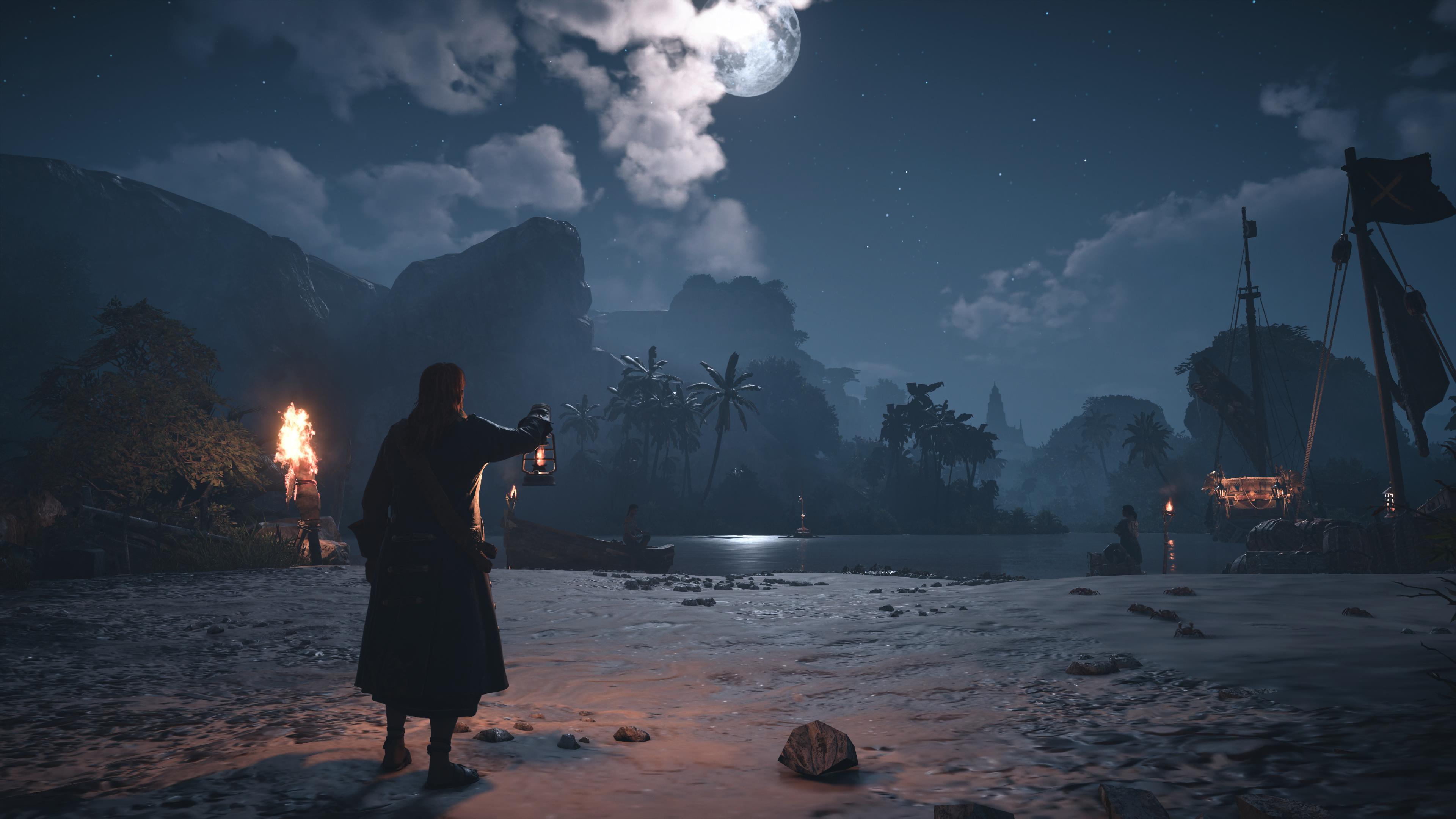
This live service rhythm defines Skull and Bones even before it hits the endgame. It's basically impossible to just buy enough ammo with silver except in small quantities at outposts. No, to get enough to feel well-equipped I must craft it enmasse, which requires a grind for materials (granted, I didn't start to run out of ammo regularly until late in the game, and small portions can be looted). Small mercy for the cash rich: If you want to just fast travel everywhere and unlock stuff quicker, in-game currency is available for real world cash.
Still, as time went by I didn't mind how languid Skull and Bones' pace is. Call it Stockholm Syndrome, but I came to like the vibe of Skull and Bones enough to make peace with the banality of its systems. I mean, millions of people have made peace with Destiny 2 and The Division 2, and they don't even have boats. I begrudgingly made peace with Skull and Bones' egregious delaying tactics because at its core, what it offers is really appealing to me and its heights are brilliant. I can often smell the salt in this game. I love its atmosphere, even if I almost always shushed my crew's incessant shanties.
Grand theft boat
After I've won Scurlock's respect I move onto the second pirate hub, Telok Penjarah, to do the bidding of pirate kingpin and former admiral Rahma, who has a very big bone to pick with the Dutch. Skull and Bones' early criminal misanthropy gives way to a narrative about resistance to extractive colonialism, but aside from Rahma's occasional soliloquy, the tone shift has no effect on what I do on a moment-to-moment basis: set sail, sail a lot, and blow up other ships. It's during this second-half of the game where Skull and Bones' lack of on-foot conflict starts to feel discordant.
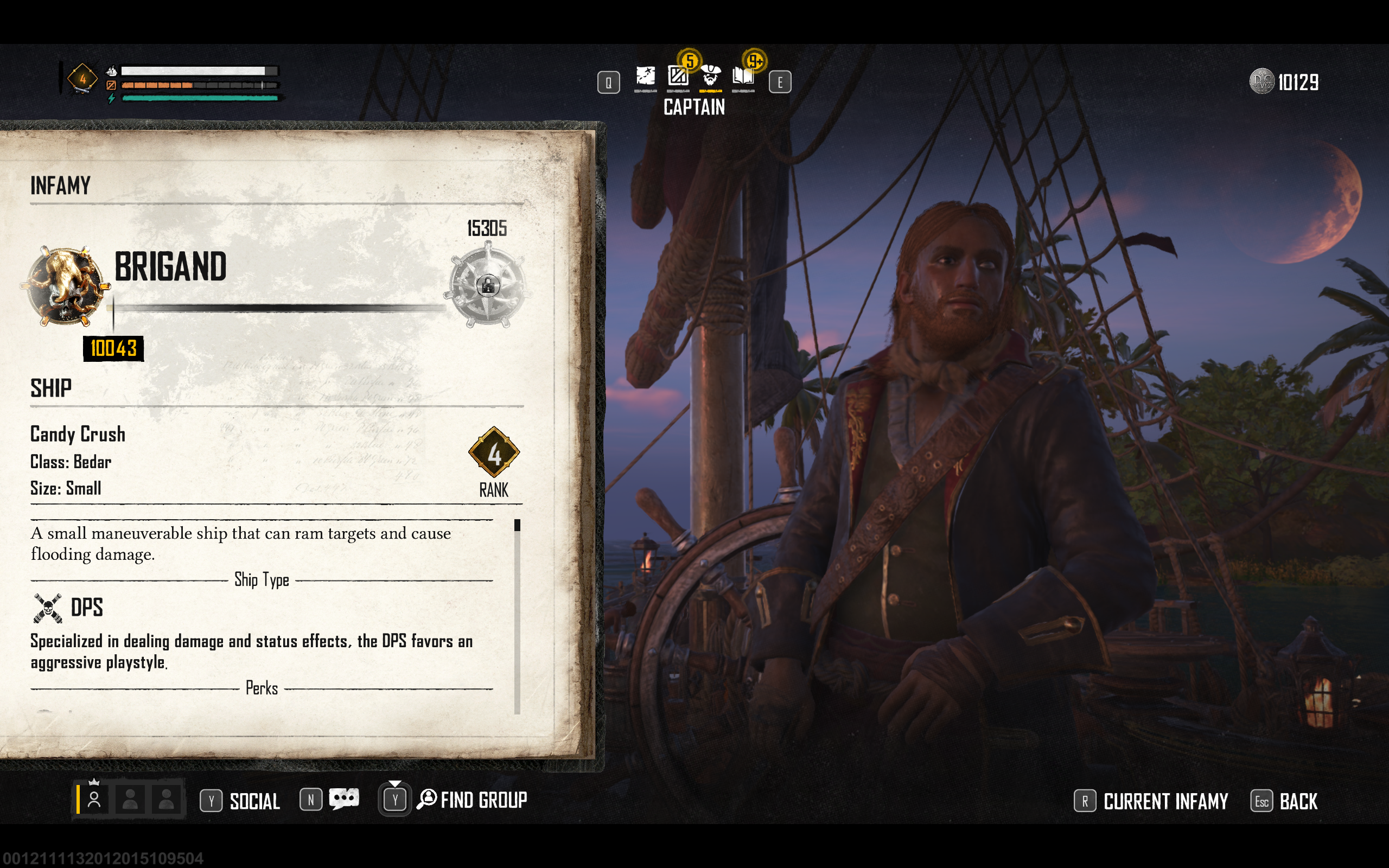
Before the endgame, few are the baddies who will attack on sight because the various factions and colonial organisations don't remember who I am after I've lost their scent after any given skirmish. It's basically akin to the GTA wanted level model. Scurlock is always saying in the early game that I'm building a reputation among these French and Dutch water cops. He foreshadows a tense allegiance-based roleplay that never materialises, because there is actually no such thing as a "reputation" in Skull and Bones unless tied to certain late game narrative beats. No matter how many dozen or so lowly Compagnie I slaughter a little off shore of one of their settlements, I'm newly an innocent ol' pirate boat once I've sailed out of sight around a distant foreshore.
It's disappointing that my actions don't affect the world or my standing in it. It makes the world feel like a playground for resource extraction—quite the thematic disjunct!—rather than a risky and remote expanse. The whole game amounts to doing a bunch of busywork to get bigger and steal more stuff. Maybe this is a kind of documentarian depiction of the workaday graft of piracy; maybe it's meant to be demystifying.
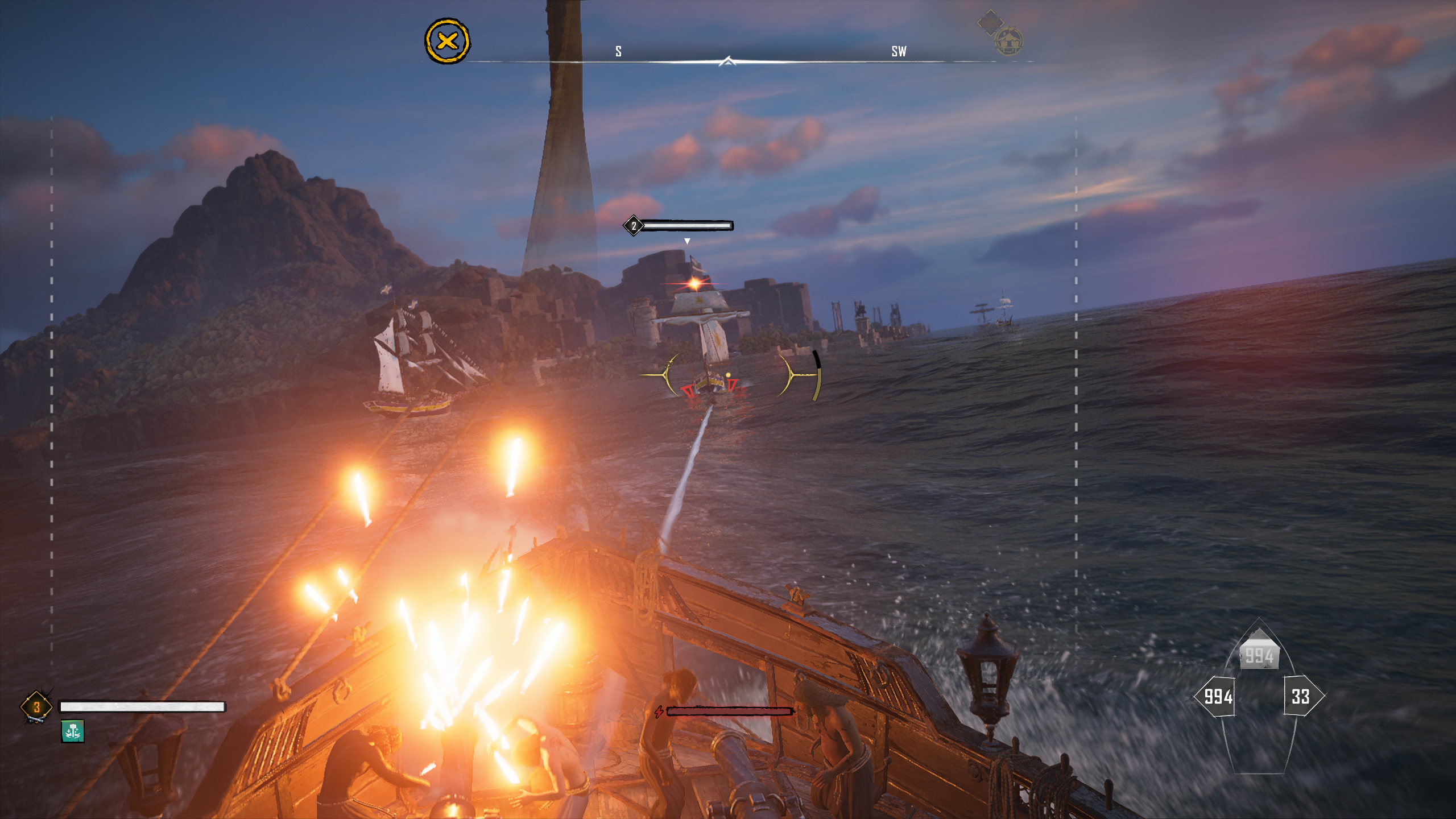
The endgame
The Black Market is introduced early on as a side hustle in robbing contraband, moving contraband around with thieves in pursuit, and creating rum and opium from pillaged ingredients. But it re-emerges as the central theme of the endgame, introducing both PvP and PvPvE encounters that if completed successfully, help build a network of "Manufactories" that generate a certain amount of Skull and Bones' endgame currency—Pieces of Eight—on an hourly basis.
Each of these Manufactories need to be funded with silver every in-game hour, and each pay-off of Pieces of Eight needs to be manually retrieved and brought back to a pirate haven, which is dangerous because by late game there are more attack-on-sight pirates lurking. This in itself is time consuming, especially when I've captured a handful of hard-earned Manufactories, but the chillness of the main game is supplanted with a constant sense of anxiety that some will appreciate. All Manufactories and attendant leaderboards reset when the next season starts. There's a lot here for those who want to stick around.
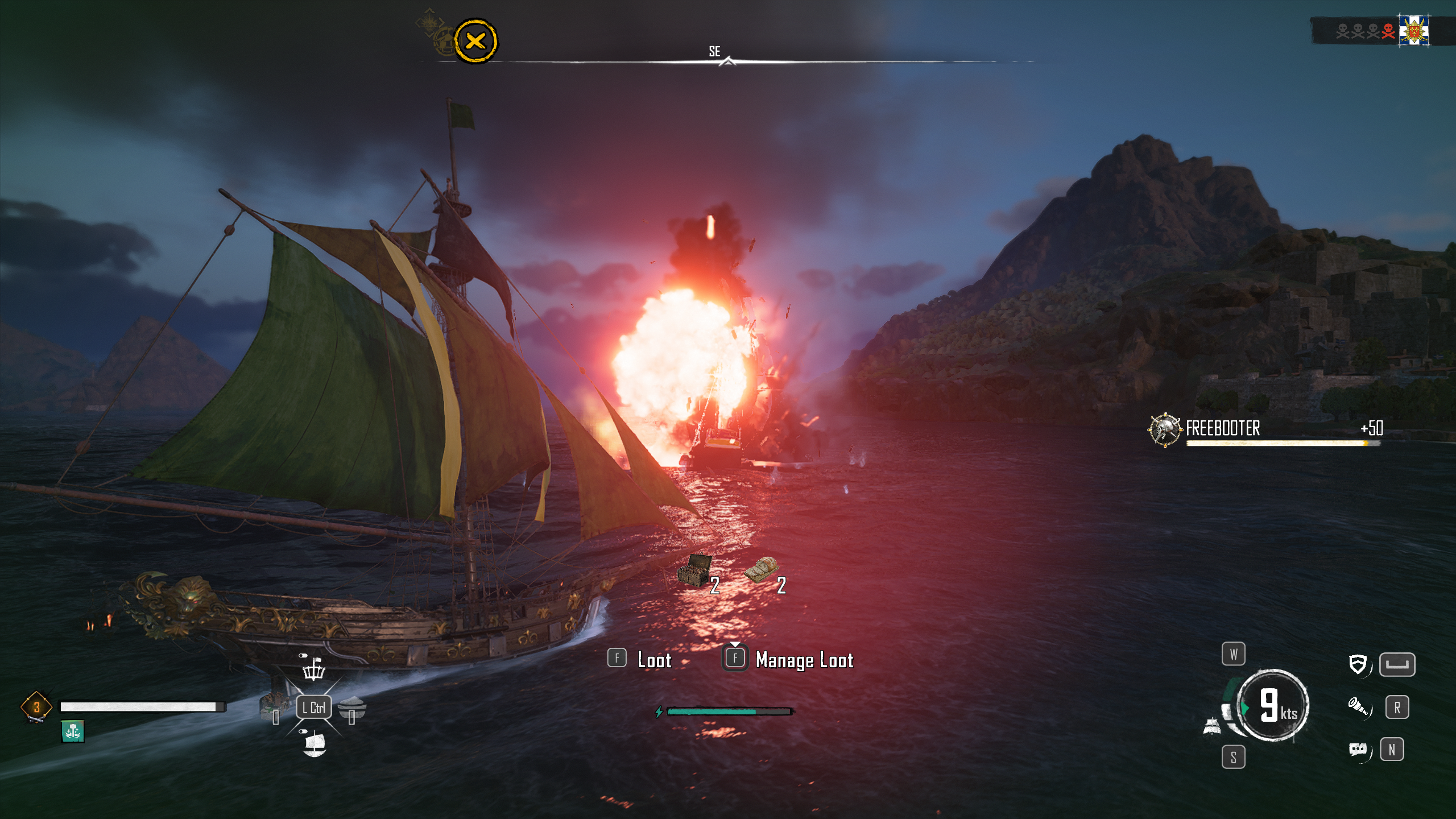
I don't think Skull and Bones is the disaster many were expecting.
PvP is often hilarious in a good way, especially in the PvPvE situations where there can be upwards of ten boats in a small body of water and the action is relentless. The campaign is a good time for boat enthusiasts but for anyone after something more challenging than the sourcing of materials on the high seas, this is where the game gets good. It's naturally still tethered to a grind—those Pieces of Eight don't come easy—but it's more varied and comedic, and requires more thought given to the optimisation of a boat's weaponry. If anything, it offers a decent bedrock for further updates and tweaks to the formula.
Doing this in a co-op crew is obviously more fun than doing it alone; the same can be said for any game. But teaming up ad-hoc with randoms with vastly different ideas about what should be done across a big stretch of water means that it's rarely worth it, because no matter how close or far I am from those presumed collaborators, the strength of enemy ships is greater. It rarely makes the higher loot payoff worth it. Bring a friend who'll stick around and not wander off, and the cooperative experience is worth it, so long as you like the friend.
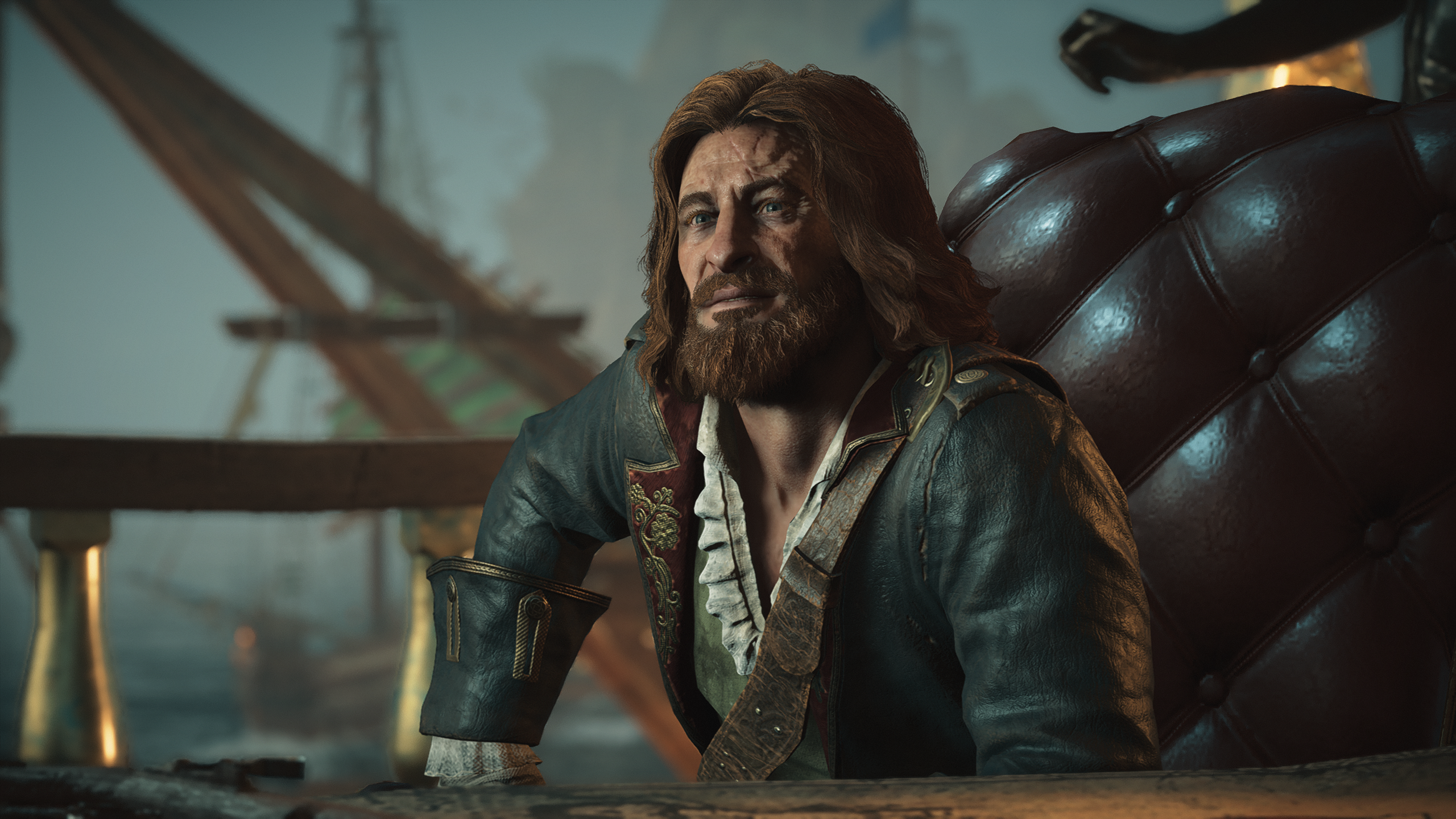
I don't think Skull and Bones is the disaster many were expecting. If The Division 2 or Suicide Squad can find enthusiasts, I feel like this boating game will live a marginal life among a boat-enthusiast niche, in the same way For Honor did. It transplants a busywork genre obsessed with engagement and live service trappings into a seafaring context. If anything, I respect its single mindedness. It ran well on my RTX 3060 gaming laptop, only occasionally dropping frames in the busier on-foot pirate enclaves or when there were many, many boats fighting on screen with all attendant smoke.
I like Skull and Bones but I also resent it. It has the makings of a great pirate game but it's hamstrung by live service orthodoxy. It doesn't compare favourably with the ten-year old game that inspired it, unless one's measure of a good game is the amount of hours it can occupy in one's life. Still, to expect a blockbuster game about sailing big clumsy boats to be anything else in 2024 is foolhardy. This will do. Don't hate the player, hate the game. There's no way Skull and Bones could exist right now in any other form.
Combining moody and gratifying ship-on-ship combat with shallow live service trappings, Skull and Bones is great within the claustrophobic parameters of what market forces allow it to be.

Shaun Prescott is the Australian editor of PC Gamer. With over ten years experience covering the games industry, his work has appeared on GamesRadar+, TechRadar, The Guardian, PLAY Magazine, the Sydney Morning Herald, and more. Specific interests include indie games, obscure Metroidvanias, speedrunning, experimental games and FPSs. He thinks Lulu by Metallica and Lou Reed is an all-time classic that will receive its due critical reappraisal one day.
